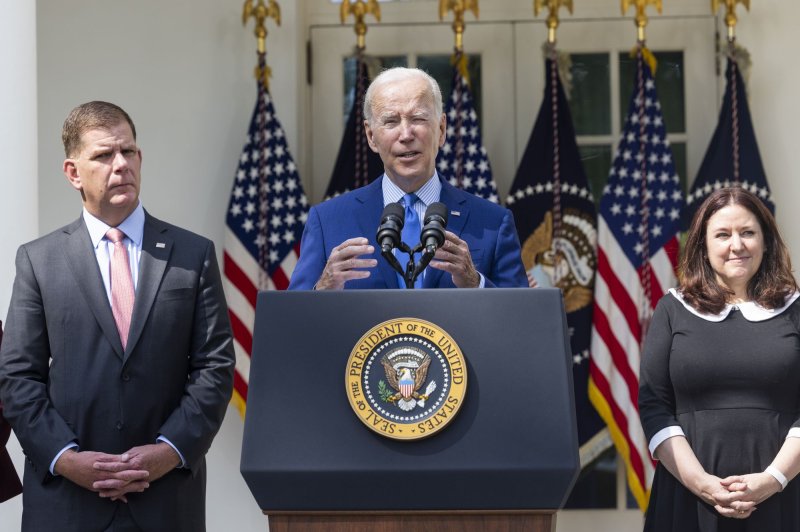U.S. President Joe Biden (C) at the White House on September 15, 2022. A key rail union -- the BMWE -- announced Wednesday it is extending a "cooling-off" period to Dec. 9 so talks can continue to avert a national U.S. rail strike. Two rail unions have rejected a tentative deal brokered by the Biden administration. The railroads welcomed the BMWE extension of talks. Photo by Jim Lo Scalzo/UPI |
License Photo
Nov. 9 (UPI) -- The railroad union Brotherhood of Maintenance of Way Employees-IBT announced Wednesday it is extending talks to Dec. 9 in an effort to avert a possibly catastrophic U.S. freight rail strike.
The Teamsters-affiliated union said in a statement: "This is the railroads' last chance to do the right thing by voluntarily agreeing to provide paid sick leave to all employees. If the railroads fail to give up one penny of every dollar of profit for paid sick leave for their highly valued employees by December 8, and there is either a strike or lockout or both, then the railroads will be responsible for the imposition of a shutdown of their operations and the economic harms to its customers, the country's economic supply chain and the entire U.S. economy."
The union said agreeing to paid sick leave would cost the railroads one penny of every dollar in profit.
"It is less than 2 percent of the $11.5 BILLION that CSX, NS and UP have spent alone on stock buybacks through the third quarter of 2022," the BMWE said in its statement. "Stock buybacks that simply enhance the wealth of investors and do absolutely nothing to improve the railroads' infrastructure or lackluster services."
The American Association of Railroads said in a statement Wednesday that the extension of the cooling-off period by the BMWE allowing for the talks to continue will provide greater certainty for the U.S. economy.
"This agreement to extend the cooling off period affords all unionized employees the opportunity to vote on their agreements free of a looming strike threat," said AAR President and CEO Ian Jefferies in the statement. "Our goal remains the same -- successfully completing this round of bargaining -- and we stand ready to reach an agreement with BMWED based upon the Presidential Emergency Board's recommendations."
The AAR statement said to date seven rail labor unions have ratified the tentative agreement reached through the help of the Biden administration.
Two, the BMWE and the Brotherhood of Railroad Signalmen, have voted down the tentative deal. Two other rails unions -- BLET and SMART-TD -- will have the opportunity to finish their ratification votes during the extended cooling off period that ends Dec. 9, according to the BMWE.
The BMWE statement said railroads are continuing to reject "all BMWE and BRS proposals for paid sick leave."
A coalition of labor unions bargained to try to reach agreement with railroads on new labor contracts and a tentative deal was brokered by the Biden administration.
According to the railroads, the tentative deal called for a 14.1% pay hike immediately and a total of 24% in wage increases by 2024. But lack of paid sick leave is the main sticking point for the two unions that have rejected the proposed deal.
The BMWE said reports indicate the railroads intend to begin ceasing various rail operations "within the next few days" in anticipation of a Nov. 20 strike.
The union said these shutdowns "would be a premature exercise of self-help by the railroads and a violation of their common carrier obligations to provide services to their customers. These shutdowns would also represent a blatant attempt to cause panic and economic harm to the railroads' customers and the U.S. economy right before the Thanksgiving holiday. "
The Association of American Railroads said in September that a nationwide rail strike could cost as much as $2 billion a day, idling 7,000 trains daily.















